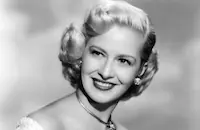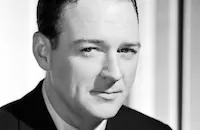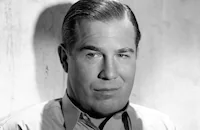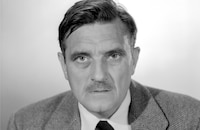Swing Fever

Brief Synopsis
Cast & Crew
Tim Whelan
Kay Kyser
Marilyn Maxwell
William Gargan
Nat Pendleton
Lena Horne
Film Details
Technical Specs

Synopsis
Having just arrived in New York from the South, naïve classical composer and conductor Lowell Blackford shows up at a music publishing house and auditions his new "symphonietta" for both the company's manager and popular singer Ginger Gray. Lowell's audition is derailed by the arrival of "Waltzy" Malone, a boxing manager who is half-heartedly engaged to Ginger. No sooner does Waltzy announce to Ginger that he just sold a half-interest in his latest "discovery," a heavyweight boxer named "Killer" Kennedy, to nightclub owner Nick Sirocco, than Nick calls to tell Waltzy that Killer was knocked out during a warm-up bout. Distressed because Killer is scheduled to fight the world champion, Kid Mandell, Waltzy and Ginger leave for Killer's gymnasium. As they are rushing out, Ginger tells a befuddled Lowell that his florid music is "sweet." Lowell then realizes that Ginger mistakenly picked up his sheet music and asks the publisher's receptionist where Ginger is headed. When the receptionist refuses to divulge the information, Lowell reluctantly entrances her with a fixed stare and draws the address out of her. At the gymnasium, Lowell finds Waltzy and Dan Conlon, Kid's manager, whom Waltzy has learned was responsible for Killer's knock-out, brawling with each other. Seeing his music in Waltzy's coat pocket, Lowell stops the fight by paralyzing Waltzy with his stare and grabs his music just before Conlon knocks Waltzy out. After Waltzy regains consciousness, an apologetic Lowell explains that he inherited the Blackford "evil eye" and can entrance anyone with his stare. Waltzy soon concludes that Lowell's talent could be used to help Killer win his fight and orders Ginger to bring the composer back on a pretext. Believing that Waltzy and Nick are interested only in his music, Lowell agrees to showcase his symphonietta at Nick's club. The club's jazz band, with whom Ginger sings, has difficulty playing Lowell's staid orchestral piece, so Ginger writes lyrics for it and instructs the band to perform the music to a swing beat. Soon Lowell and his orchestra are the hit of the club circuit, and Lowell has fallen in love with Ginger. With Killer's big match approaching, Waltzy has Ginger "confess" to Lowell that Killer is her brother and that their grandmother is terrified that he will be hurt in the big bout. As hoped, Lowell offers to use his "evil eye" to entrance Kid during the bout. When the lovestruck Lowell later proposes to Ginger after a canteen benefit, however, Ginger, who is unsure about her feelings, stalls for time, and Lowell assumes she is not in love with him. Waltzy becomes frantic when he sees Lowell packing for home and tricks him into believing that Ginger has accepted his proposal. Waltzy's relief is shortlived, however, as Lowell then announces that he is planning to enlist. As a delay tactic, Waltzy hires the phony Dr. Clyde L. Star to examine Lowell and diagnose a heart condition that is treatable only by exposure to exciting activities such as boxing. When Ginger discovers Waltzy's latest ruse, she confesses the entire plot to Lowell, then angrily breaks with Waltzy. With the bout only minutes away, a desperate Waltzy tells Lowell that he will kill Ginger if he fails to mesmerize Kid. To save Ginger, Lowell jumps in a cab with Star, only to discover that Star is in cahoots with Conlon and he is being kidnapped by Conlon's thugs. Using his "evil eye," Lowell escapes and rushes to the boxing arena, where Killer is being torn apart by Kid. After a series of mishaps, Lowell finally manages to entrance Kid, who is then knocked out by Killer. Later, just before Lowell's last show at Nick's, Waltzy insists to the forgiving band leader that Ginger, who left New York during the fight, is still missing. As Lowell begins the show, however, Waltzy escorts Ginger to the stage and smiles as she and Lowell are reunited.

Director
Tim Whelan
Cast

Kay Kyser

Marilyn Maxwell

William Gargan

Nat Pendleton

Lena Horne

Curt Bois

Morris Ankrum
Andrew Tombes
Maxie Rosenbloom

Clyde Fillmore
Pamela Blake
Lou Nova
Jack Roper
The Merriel Abbott Dancers
Kay Kyser And His Orchestra
Harry Babbitt
Sully Mason
Ish Kabibble
Julie Conway
Trudy Irwin
Tommy Dorsey
Harry James
Virginia Rees
Ernest Newton
Don Gallaher
Jane Phelps
Lennie Smith
Ormon Downes
Don Whittaker

Donald Curtis
Earle Dewey

Freddie Steele
Henry Golden
Art Foster
Jack West

Mike Mazurki
Sammy Stein
Henri Desoto
William Bishop

Wally Cassell
Mary Elliott
Russell Gleason

Mantan Moreland
Celia Travers
Mary Mcleod
Anne O'neal
Chester Clute
Jack Lambert
Dan Tobey
George Levine
Abe Roth
Murray Alper
George Chandler
Ernie Alexander
Harry Fleischmann
Edward Shattuck
Duke Johnson
Frank Hagney
Henry Jordan
Rube Schaffer
Virginia Engels
George Magrill
Tom Hanlon
Bobby Barber
Charles Sullivan
Katharine Booth
Kathleen Williams

Ava Gardner
Lorin Raker
Crew
Rollie Asher
Earl Brent
Matt Brooks
Lew Brown
Nacio Herb Brown
Walter Donaldson
George Dunning
Raymond B. Egan
Sammy Fain
Ralph Freed
Dave Friedman
Cedric Gibbons
Stephen Goossón
Wally Heglin
Joseph Hoffman
Irene
Roy K. Marsh
Ernst Matray
Maria Matray
Phil Moore
Mclean Nisbet
Mitchell Parish
Nat Perrin
Tom Pitts
Merrill Pye
Harry Rapf
Charles Riesner
Charles Rosher
Sharaff
Douglas Shearer
Sunny Skylar
David Snell
Irving Starr
Georgie Stoll
Marvin Stuart
Ferris Webster
Edwin B. Willis
Warren Wilson

Photo Collections
Videos
Movie Clip



Trailer
Film Details
Technical Specs

Articles
Swing Fever
Damon Runyon once said of Maxwell, "She's one of those girls who set a guy's pulse to racing by the merest glance in his direction." Forgotten today, Maxwell flirted with stardom for most of her career but never quite made the jump. Her full birth-name was Marvel Marilyn Maxwell, and in 1942 she shot screen tests at Paramount and MGM. MGM offered her a contract, but only if she would change the name "Marvel." She simply deleted it, going with her middle name instead. She was then placed in a string of small roles over the next couple of years, but some of these pictures were quite notable, such as Du Barry Was a Lady (1943), Thousands Cheer (1943), Pilot #5 (1943) and Best Foot Forward (1943). Later she had bigger roles in Summer Holiday (1948) and the exceptional films Champion (1949), made on loan-out to United Artists, and New York Confidential (1955), a Warner Brothers release. Through all this time, Maxwell remained a popular radio player and nightclub entertainer.
The Kay Kyser band, with whom Maxwell performs in Swing Fever, was featured in a few other films in the early 1940s, sometimes just for a number or two. Audiences definitely knew Kyser, however: he was such a pop culture phenomenon that his weekly radio show drew an estimated regular audience of 20 million. Swing Fever was Kyser's first film after spending 18 months touring Army camps and playing for WWII servicemen.
The one and only Lena Horne also pops up here to sing one song. Horne was placed in specialty numbers in lots of movies during this period, usually in such a way that the numbers could be deleted from prints shown in southern locations. The singer was also treated with makeup to try and lighten her skin tone. Horne later said of these days at MGM: "I was always told to remember I was the first of my race to be given a chance in the movies, and I had to be careful not to step out of line, not to make a fuss. It was all a lie. The only thing that wasn't a lie was that I did make money; if I didn't, they wouldn't have kept me."
Swing Fever was shot under the title Right About Face, and the title change must have come extremely late in the game, for some trade reviews exist under the original title. In any event, critics were not kind. The New York Times said, "Lena Horne sings one song, 'Indifferent,' which is a comment upon the whole show." Variety thought the film "misses fire because of flimsy scripting and absence of effective gag situations." The critic added, "Maxwell flashes an exceptionally attractive profile, though not quite as fetching when facing the camera."
A ubiquitous screen presence in the 1930s and early 1940s, Nat Pendleton appears here as "Killer" Kennedy, one of his final movies before retirement. The role was strictly business-as-usual for a character actor who specialized in dim strongmen and befuddled cops. Off screen, Pendleton was actually highly educated -- and sometimes embarrassed by the "dem 'n dose" dialogue he was asked to spew. Later he recalled taking his grandmother to one of his pictures. "The way I murdered grammar," he said, "almost murdered Grandma!"
Elsewhere in the cast, look for prolific character actors William Gargan and Morris Ankrum, fan favorite Mike Mazurki as a wrestler, and last but certainly not least, 21-year-old Ava Gardner as a receptionist, one of many uncredited bit parts the beauty had in the early 1940s.
Producer: Irving Starr
Director: Tim Whelan
Screenplay: Nat Perrin, Warren Wilson (screenplay); Matt Brooks, Joseph Hoffman (story)
Cinematography: Charles Rosher
Art Direction: Cedric Gibbons, Stephen Goosson
Music: George Stoll (uncredited)
Film Editing: Ferris Webster
Cast: Kay Kyser (Lowell Blackford), Marilyn Maxwell (Ginger Gray), William Gargan ('Waltzy' Malone), Nat Pendleton ('Killer' Kennedy), Lena Horne (Herself), Curt Bois (Nick Sirocco), Morris Ankrum (Dan Conlon), Andrew Tombes (Dr. Clyde L. Star), Maxie Rosenbloom (Rags), Clyde Fillmore (Mr. Nagen).
BW-82m.
by Jeremy Arnold

Swing Fever
Quotes
Trivia
Notes
The working titles of this film were Right About Face and Thinkin' of You. "Thinking of you" was star Kay Kyser's radio sign-off phrase. Although Cedric Gibbons and Stephen Goossón are credited as art directors in the onscreen credits, Merrill Pye is listed as art director with Goossón in Hollywood Reporter production charts. As a rule, Pye worked only on musical numbers. Although Marilyn Maxwell's onscreen credits reads "Introducing Marilyn Maxwell," Swing Fever was not her debut film. Hollywood Reporter news items add the following information about the production: Busby Berkeley was first hired as the film's director, but was dropped in early October 1942 because of scheduling conflicts with M-G-M's 1943 musical Girl Crazy .
In mid-October 1942, however, M-G-M announced that Berkeley would co-direct the film with Kay Kyser. Marsha Hunt was to co-star with Kyser, and Nan Wynn was to play a "fat part." Neither actress appeared in the final film, however. Gus Schilling, who was known for his "Nick the Greek" character, was under consideration for a part in the film, but was not cast. Lou Nova, a former heavyweight contender, made his screen debut in the picture. According to M-G-M publicity material, Billy Coe, a real-life boxing timekeeper, was to appear as himself during the fight sequence, along with radio announcer Tom Hanlon and referee Abe Roth. Although Hanlon and Roth are credited in CBCS, Coe is not, and his appearance in the completed film has not been confirmed. Arthur Freeman and Andrew Tombes are listed as cast members in Hollywood Reporter news items, but their appearance in the final film has not been confirmed. According to a February 1944 Hollywood Reporter news item, Esther F. Olson sued Loew's, Inc. for $50,000, claiming that the studio stole the title Swing Fever from her 1940 play. The disposition of the lawsuit is not known.















